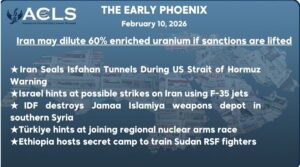ACLS Northwest Syria Earthquake SitRep, February 14
by Mahmoud al-Bakour
Humanitarian aid continues to enter northwest Syria after the reopening of two additional border crossings from Turkey to Syria that have been closed to international aid for more than two years.
- The bodies of Syrians who died in the earthquake in Turkey continue to be transported back to Syria for burial by their families. As of February 14, 1,366 of the dead have been returned to Syria through the Bab al-Hawa border crossing.
- After being closed to UN aid agencies for more than two years, today, the Bab al-Salama border crossing received its first UN aid convoy since 2020. The convoy arrived less than 24 hours after UN Secretary-General Antonio Guterres announced he had received the Syrian government’s agreement for the UN to use two new border crossings for earthquake relief aid to cross into northwest Syria for three months. The two border crossings in question, at Bab al-Salamah and al-Ra’i, are under the control of Syrian opposition forces.
- In commenting on the opening of the two new crossings, the Secretary-General of the Syrian National Coalition, Haitham Rahma, said that the UN’s aid delivery in the aftermath of the disaster show the UN’s clear bias toward the Assad regime and its disregard of the victims of the earthquake in the liberated areas of Syria, which suffered the heaviest damage of any region of Syria, by far. Haitham criticized the UN’s stance of waiting for the approval of Bashar al-Assad before delivering aid to a stricken area that Assad does not control. He noted that this stance amounts to political exploitation of the humanitarian crisis to shore up the legitimacy of Assad, a war criminal who used chemical weapons. “We strongly reject the involvement of the Assad regime in any decision because it is a powerless regime,” Haitham said, adding that Assad has no legitimacy and does not represent the Syrian people, especially in the liberated areas. While the UN’s announcement says the two new crossings will be open for three months, Haitham said the opposition that controls those crossings has announced that they are permanently available, and any restriction of their use is a “legal error” since it is the opposition forces, not Assad, that have the authority to determine the crossings’ use.

- Meanwhile, a larger volume of aid from the UN and charitable associations has begun to enter the already authorized Bab Al-Hawa border crossing in opposition-held Idlib province. On February 14, the following aid shipments entered through Bab al-Hawa:
- Shafak Organization: 6 international trucks carrying NFI baskets (tent supplies)
- Watan Organization: 18 international trucks carrying NFI baskets (tent supplies)
- IHH: 14 trucks containing clothes + food baskets + blankets + clothes + flour + heating materials.
- GOAL Organization: 7 trucks carrying flour for bakeries.
- Andalus Foundation: a truck carrying blankets + clothes + carpets + medical consumables.
- “We are a Nation” association, a truck that contains a variety of relief materials.
- Turkish Religious Endowment: 8 trucks containing clothes + health water + food baskets + coal + construction cement.
- Ghiras Al-Khair Association: 5 trucks containing sponges + shampoo + washing powder + pillows.
- Association of “What You Gave is Yours”: two trucks carrying relief materials formed.
- Charities Association: 4 trucks containing diapers + flour + food baskets.
- Zaid bin Thabit Association: A truck containing school chairs and tables.
- Finally, on February 14, four new foreign media teams entered through the Bab al-Hawa crossing to cover the situation in northwest Syria. The news organizations include Reuters, CBS, Die Zeit, and La Republica.



